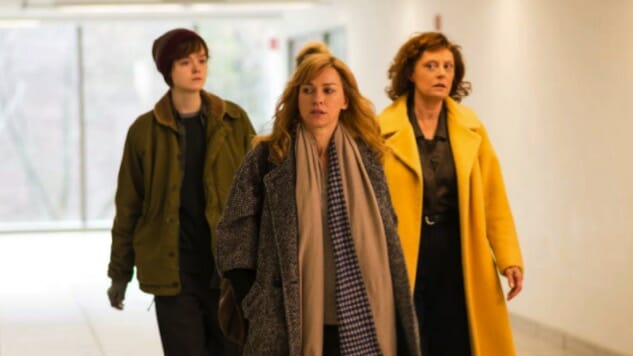This film was originally called About Ray when it premiered at the Toronto Film Festival in 2015, but the new title better reflects the focus of the story—or at least the film as it is after director Gaby Dellal re-edited it in the interim. Ray (Elle Fanning), a transgender boy preparing to begin his transition, is not in fact the main character. Rather, his mother Maggie (Naomi Watts) consumes the lion’s share of the screen time, increasingly so as the movie goes on. It would almost be a bold move if 3 Generations did this in a way that treated Ray’s gender identity as a casual matter of fact, but it is the core of Fanning’s performance and informs too much of the plot for this to come off as anything but strange.
To the movie’s credit, it skips many of the clichés about trans coming out and identity crises, with Ray already settled on his course of action and preparing to begin hormone replacement therapy literally in the first scene. But there’s one problem: The paperwork requires the signature of both of Ray’s parents, which means Maggie needs to seek out her long-estranged ex-husband (Tate Donovan). He’s reticent to do so, but the story isn’t even so much about Maggie’s efforts to convince him, as it is her endless wavering inaction. At times, she doubts whether even she wants to sign off on the HRT. At the same time, Ray prepares for his transition and his grandmother, Dolly (Susan Sarandon), hangs around dropping sassy bon mots and prodding Maggie to finally move herself and Ray out of the family brownstone.
As with every case of a non-trans actor playing a trans character, Fanning’s casting has caused controversy, and justly so. It’s difficult to see how transgender actors will advance in the film industry if even smaller movies give their stories to cis people. But even if Ray were played by an actual trans boy, with no other changes, he’d still be drastically underserved by the script. There are intriguing glimpses of his life, in trans-specific experiences (he ducks out of school to a restaurant across the street to use the bathroom), more general teenage drama (fighting with his mom) and where those intersect (crushing on a girl, only for it to be spoiled when he realizes she seems him only as female). But Maggie being at the helm often turns Ray into more of a plot device than a character—something to be figured out instead of someone with their own agency.
As befits the title, 3 Generations examines the different ways Ray, his mother, and his grandmother deal with his situation. Ray is Gen Z, feeling fully empowered to understand his gender dysphoria by internet access. Maggie is the well-meaning Gen Xer struggling to understand what’s happened to the person she’s thought of as her daughter for such a long time. Baby boomer Dolly doesn’t get it at all, even though she’s a lesbian and second-wave feminist. (Best line in the film: “Having sex with women doesn’t mean you’re open-minded; it just means you’re happy.”) Reactions to the film likely hinge on where in that spectrum audiences fall. Older viewers will likely identify with Maggie and/or Dolly and sympathize with their arcs, which of course eventually bring them around to complete acceptance of Ray, even if they don’t comprehend his condition—the golden ideal of good liberal morality. Younger viewers will likely be irritated, perhaps even enraged, by Maggie’s inability to consistently stand up for her son, and Dolly’s jokes. (At one point, she compares genital surgery to female circumcision.)
3 Generations clearly means well, but it attempts to tell a “universal” story about changing family dynamics and the physical shifts of puberty via a specific phenomenon which it does not truly comprehend. And it does so without any apparent creative input from transgender people behind the scenes. At the center is a basically disconnected series of incidents around Watts doing an embarrassing variation on a woman-child. Despite scattered well-done beats (nursing a black eye with a cold stuffed hen is kind of inspired), this film mostly backfires.
Director: Gaby Dellal
Writer: Nicole Beckwith, Gaby Dellal
Starring: Naomi Watts, Elle Fanning, Susan Sarandon, Linda Edmond, Tate Donovan
Release Date: May 5, 2017
